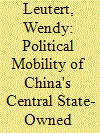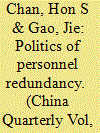| Srl | Item |
| 1 |
ID:
159823


|
|
|
|
|
| Summary/Abstract |
Extensive research on the political mobility of Chinese officials at central, provincial, municipal and county levels has yet to fully consider an important group of elites – the leaders of China's core central state-owned enterprises (SOEs). This paper presents the first systematic analysis of their political mobility between 2003 and 2012 using an original biographical dataset with 864 leader-year observations. Under the Hu Jintao administration, these leaders emerged as a distinctive group within China's top political elite: increasingly well-educated but lacking experience beyond state-owned industry, with both lengthening leadership tenures and years of previous work in their companies. Instead of a “revolving door” through which these individuals rotate routinely between state-owned business and the Party-state to positions of successively higher rank, a top executive posting was most often a “one-way exit” to retirement. Of those who advanced politically, virtually all were transferred laterally along three career pathways with little overlap: to other core central SOEs; provinces; and the centre. This paper underscores the theoretical importance of disaggregating types of lateral transfer to research on Chinese officials’ political mobility and the cadre management system.
|
|
|
|
|
|
|
|
|
|
|
|
|
|
|
|
| 2 |
ID:
161059


|
|
|
|
|
| Summary/Abstract |
This study provides an overview of the origin, importance and strength of the non-leading cadre system and argues that the system plays a key role in building resilience in China's bureaucracy. The non-leading cadre system is administratively and politically important because it makes the party-state bureaucracy more adaptable and fosters cohesion among the elite cadre workforce. Although the system may appear to have institutionalized redundancy, this study argues that this redundancy has the benefit of making movement between leading and non-leading cadre status possible. In other words, the non-leading cadre system provides the various levels of the party-state bureaucracy with the leverage to develop their own measures for resolving their own problems. Putting aside the deficiencies in implementation, the non-leading cadre system is likely to remain durable and will help to develop an agile and resilient personnel management system, at least in the short to medium term.
|
|
|
|
|
|
|
|
|
|
|
|
|
|
|
|
| 3 |
ID:
089329


|
|
|
|
|
| Publication |
2009.
|
| Summary/Abstract |
This paper explores historically Russia's status as a great power in first the European and later the global states system. It argues that its role as a 'superpower' was really a temporary aberration during the Cold War period and that since the collapse of the Soviet Union Russian foreign policy has been essentially guided by the desire to reaffirm its great power status and emergence as an energy superpower centred on the export of oil and gas. Western policy towards Russia needs to be guided by a far more sophisticated awareness of this transformation and a greater understanding of the importance of the symbols of power and status that might look rather dated and backward looking in terms of the construction of regional European security and the 'post-national' project of the European Union.
|
|
|
|
|
|
|
|
|
|
|
|
|
|
|
|
| 4 |
ID:
105168


|
|
|
|
|
| Publication |
2011.
|
| Summary/Abstract |
A salient feature of China's Great Leap Famine is that political radicalism varied enormously across provinces. Using excessive grain procurement as a pertinent measure, we find that such variations were patterned systematically on the political career incentives of Communist Party officials rather than the conventionally assumed ideology or personal idiosyncrasies. Political rank alone can explain 16.83% of the excess death rate: the excess procurement ratio of provinces governed by alternate members of the Central Committee was about 3% higher than in provinces governed by full members, or there was an approximate 1.11‰ increase in the excess death rate. The stronger career incentives of alternate members can be explained by the distinctly greater privileges, status, and power conferred only on the rank of full members of the Central Committee and the "entry barriers" to the Politburo that full members faced.
|
|
|
|
|
|
|
|
|
|
|
|
|
|
|
|